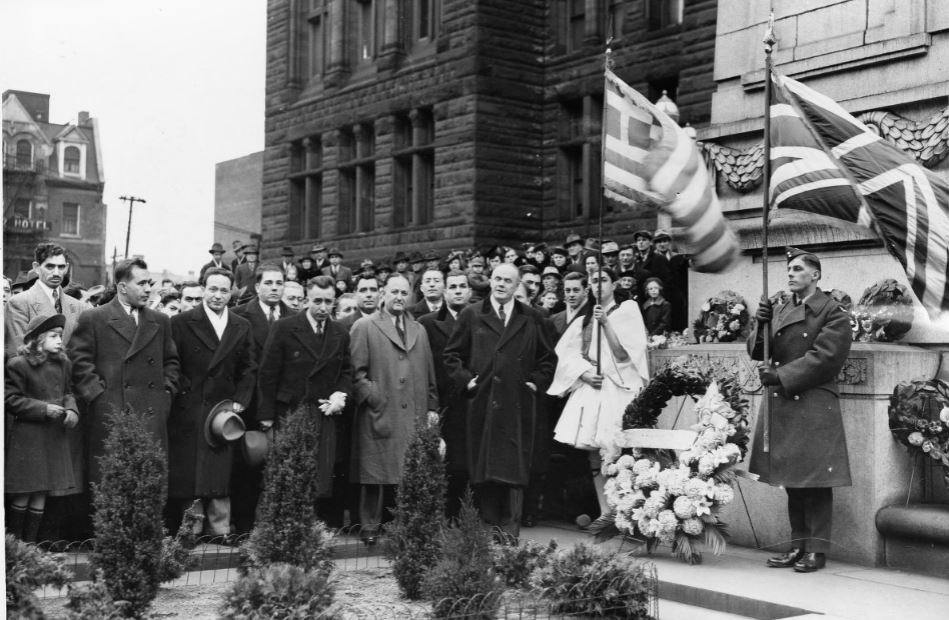
March 27, 2023
Years ago, I bumped into a Greek colleague and her guest at work. Teaching at a start-up university in Abu Dhabi, encounters with intriguing visitors were a welcome perk. My colleague introduced us, referring to me as “Greek, but not ‘Greek Greek.’” Not Greek Greek; the label was unique, but the sentiment was not. Many Greek Canadians can recount similar experiences. Our place in Greekness hierarchies is rarely communicated with such clumsiness and candour. Typically, our claims of cultural affinity are subtly rejected through glances, efforts to correct our pronunciation, or politely shifting slow Grenglish conversations to English. Our self-identification is rejected as inauthentic; our efforts to participate in Greek culture are impeded. We remain Greek, but not Greek Greek.
Hellenic heritage month leaves us ambiguous Greeks—the “my name is ‘Vasilis,’ but you can call me ‘Bill’” Greeks—in an odd predicament. Kin ties keep us clinging to an ancestral homeland with a storied past; pride in peacekeeping, multiculturalism, and universal healthcare root us here. Greeks invented everything, and “the world needs more Canada.” Style guides may have dispensed with the hyphen that once linked these two parts of our identity; we have not. We awkwardly straddle it. And yet, most of us feel uneasy among Greek nationalists or “old stock” Canadians. We are disturbed by right-wing populist rhetoric and annoyed by the deliberate mispronunciation of our names. Our relationships with Greece and Canada are marked by intimacy and estrangement.
Given our tenuous attachments, we position ourselves between these two reference points. Yet neither Greekness nor Canadianness is fixed. In Greece, the reductive ethnonationalism of Vryzakis’ paintings and Paparrigopoulos’ histories sits alongside Engonopoulos’ surrealist masterpieces, Killah P’s hip hop, and the Greek Weird Wave within a vibrant cultural tapestry. O Geros tou Moria and o Negros tou Moria coexist in the national consciousness. Similarly, the Canada of Sir John A. MacDonald and Hemsworth’s “log driver’s waltz” has made space for Viola Desmond and a long-overdue discussion of settler colonialism. National cultures contain texture. They comprise competing efforts to articulate a collective self-definition, invent a common history, and propose a shared future. As Greek Canadians, we are not disqualified from participating in either culture. Suggestions that our Greekness has been diluted—that we are Greek jook sing—should have no bearing on how we perform identity and enact difference. In fact, we should celebrate our cultural agility. After all, we are as comfortable flambéing saganaki in brandy as we are frying chicken wings and rooting for the Leafs—or the Habs, if you have bad taste.
We are uniquely positioned to participate in Greek and Canadian cultures. This does not mean practicing culture in a superficial manner that uncritically centres the nation. Hellenic heritage month loses all value if treated as an invitation to exchange poutine for souvlaki. Instead, March offers all Ontarians an opportunity to reflect upon the emergence, diffusion, and resonance of classical Greek thought. Appreciating the fifth-century “miracle” as a product of worldly engagement and adaptation—rather than innate ability or racial superiority—is a valuable lesson. Yet, Hellenic heritage month invites us to dig further and farther. Hellenism was not entirely born in Greece, nor was its impact restricted there. Hellenism is a constellation of thought and expression that belongs to our global heritage. Accordingly, this month encourages us to read our Plato and Aristotle, as well as Arab and Persian philosophers like al-Kindi and al-Farabi, who incorporated ancient Greek philosophy into an Islamic framework. It challenges us to consider why classical Greek architecture loomed so large for Japanese architect Itō Chūta and Indian archaeologist Rajendralal Mitra. It provokes us to examine how Bertolt Brecht’s contributions to theatre were cultivated through productive engagement with a dramatic tradition initiated by Aristotle’s Poetics. And it permits us to reflect upon Hellenism’s enduring relevance by exploring how MacArthur “Genius” Luis Alfaro adapted Sophocles’ tragedies into a twenty-first-century Latinx context. Ontarians should use Hellenic heritage month to explore this shared heritage. “Everyone should be Greek in his own way!” Goethe instructs, “but he should be Greek.”
Yet, Hellenic heritage month also offers Greek Canadians a unique opportunity. It invites us to disrupt the stale retelling of our history as the story of one monolithic community’s struggle for “middle-class respectability.” Our history is far more compelling and contentious. Homeland politics often incited local frictions, particularly during the national schism when Greek Canadians were unwilling to share the same institutional spaces. Public spats over preferred political candidates and legal disputes between community and church have nurtured long-standing enmities. We have seen this, we have lived this, and we should preserve these memories—alongside the more banal tokens of our varied experiences. We can build upon collaborations like Immigrec by mobilizing older generations to share their stories with the “Greeks in Canada: A Digital Public History Project” and entrust personal archives to the HHF Greek Canadian Archives at York University. Hellenic heritage month allows us to tell our story with all its triumphs, blemishes, and contradictions, and to affirm our identity as Greek Canadians. We may not be Greek Greek, but being Greek Canadian has its charm, too.
Vasilis (Bill) Molos
Director and Research Lead, HHF Greek Canadian Archives at York University
vmolos at yorku.ca
